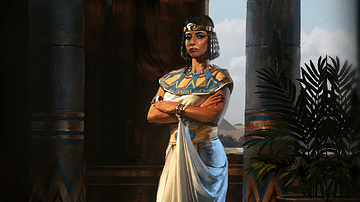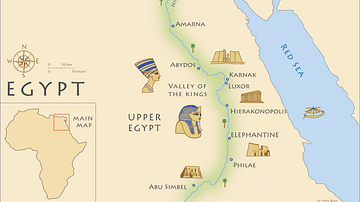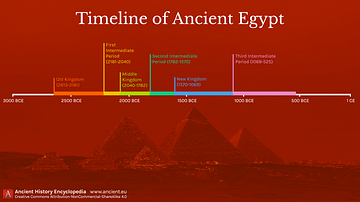Search
Search Results

Collection
Queens of Ancient Egypt
Women were given greater respect in Egypt than in most other civilizations of the ancient world. There were female doctors, scribes, business owners, and even rulers. Although kings in ancient Egypt were understood as a reflection of the...

Collection
Magic & Medicine in Ancient Egypt
Magic and medicine in ancient Egypt were understood as gifts from the god Heka, who presided over both, and were used together – or interchangeably – by medical professionals in treating patients. 'Magic' was recognized as the act of drawing...

Collection
Writing in Ancient Egypt
Writing in ancient Egypt developed sometime prior to the Early Dynastic Period (c. 3150-2613 BCE) and came to be recognized as a gift of the god Thoth who empowered humanity through the written word. Writing preserved memory, honored the...

Video
Ancient Egypt: Crash Course World History #4
In which John covers the long, long history of ancient Egypt, including the Old, Middle and New Kingdoms, and even a couple of intermediate periods. Learn about mummies, pharaohs, pyramids and the Nile with John Green. Crash Course World...

Video
Ancient Egypt: Economy
This video is an explanation of ancient Egyptian economy.
Source: Burstein, M. Stanley, "World History: Ancient Civilizations". Social Studies. Holt, California. 2006.

Video
Ancient Egypt: Crash Course World History #4
In which John covers the long, long history of ancient Egypt, including the Old, Middle and New Kingdoms, and even a couple of intermediate periods. Learn about mummies, pharaohs, pyramids and the Nile with John Green. Crash Course World...

Video
Ancient Egypt: Architecture
An overview of Ancient Egyptian architecture using the Great Pyramids and Sphinx at Giza as examples.

Video
Ancient Egypt Social Structure
The social pyramid of ancient Egyptian society,

Image
Map of Ancient Egypt
Map of ancient Egypt, showing the major cities and archaeological sites along the Nile River, from Abu Simbel in the south to Alexandria in the north .

Image
Timeline of Ancient Egypt
A timeline showing all the key periods in ancient Egyptian history: - Old Kingdom (2613-2181 BCE) - First Intermediate Period (2181-2040 BCE) - Middle Kingdom (2040-1782 BCE) - Second Intermediate Period (1782-1570 BCE) - New Kingdom...